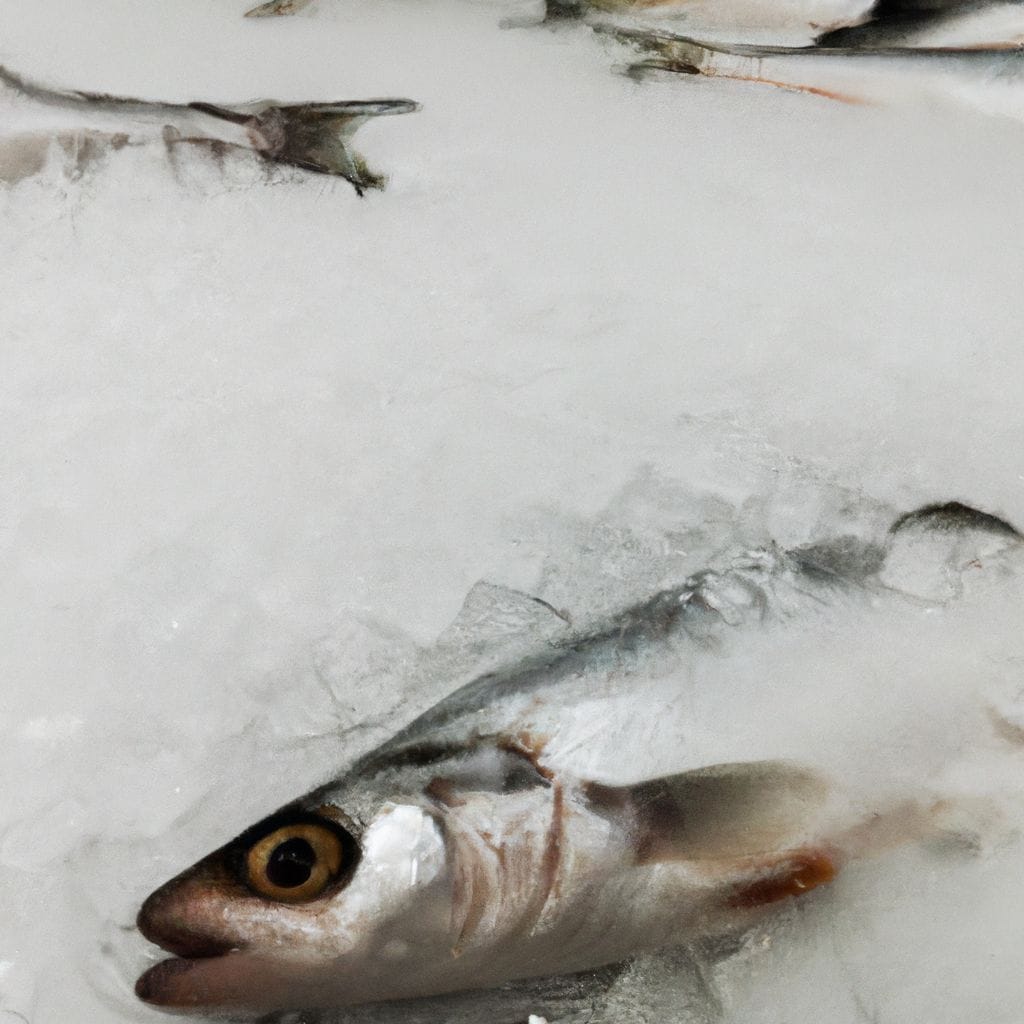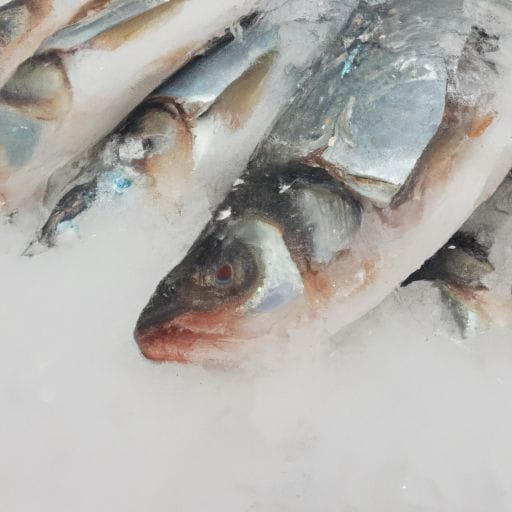Fish is a popular food item that can be cooked in a variety of ways. It is also a great source of protein and other essential nutrients. One of the most common ways to store fish is to freeze it. But how long can fish be frozen before it starts to lose its quality? This article will discuss the different factors that affect how long fish can be frozen and provide tips on how to properly store fish for the best results.
How Long Can Different Types of Fish Be Frozen?
Contents
- 1 How Long Can Different Types of Fish Be Frozen?
- 2 What Are the Best Practices for Freezing Fish?
- 3 How to Tell When Frozen Fish Has Gone Bad
- 4
- 5 How to Properly Defrost Frozen Fish
- 6 What Are the Benefits of Freezing Fish?
- 7 How to Store Frozen Fish for Maximum Freshness
- 8 What Are the Different Methods of Freezing Fish?
- 9 How to Cook Frozen Fish for Maximum Flavor and Nutrition
- 10 Conclusion
If you’re a fish lover, you know that freezing your catch can help you enjoy it for months to come. But how long can different types of fish be frozen? The answer depends on the type of fish and the way it’s stored.
For most types of fish, freezing is a great way to preserve them for up to six months. This includes popular varieties like salmon, trout, and cod. To ensure the best quality, wrap the fish tightly in plastic wrap or aluminum foil and place it in an airtight container.
If you’re looking to store fish for longer than six months, you’ll need to use a different method. For example, smoked fish can be frozen for up to a year. To keep it fresh, wrap it tightly in plastic wrap and place it in an airtight container.
For the longest shelf life, you can opt to can your fish. This method can preserve fish for up to two years. To can your fish, you’ll need to use a pressure canner and follow the instructions carefully.
No matter which method you choose, it’s important to remember that freezing fish can help you enjoy it for months to come. With the right storage techniques, you can enjoy your favorite fish for up to two years!
What Are the Best Practices for Freezing Fish?
When it comes to freezing fish, there are a few best practices that you should follow to ensure that your fish stays fresh and delicious. Here are some tips to help you get the most out of your frozen fish:
1. Choose the freshest fish possible. Make sure to select fish that is firm and has a bright color. Avoid fish that has a strong odor or looks slimy.
2. Clean and prepare the fish before freezing. This includes removing the scales, gutting, and filleting the fish.
3. Wrap the fish tightly in plastic wrap or aluminum foil. This will help to prevent freezer burn and keep the fish fresh.
4. Place the wrapped fish in a freezer-safe container or bag. This will help to keep the fish from absorbing other flavors and odors in the freezer.
5. Label the container or bag with the date and type of fish. This will help you keep track of when the fish was frozen and what type it is.
6. Place the container or bag in the coldest part of the freezer. This will help to keep the fish at a consistent temperature and prevent it from thawing and refreezing.
By following these best practices, you can ensure that your frozen fish stays fresh and delicious. Enjoy!
How to Tell When Frozen Fish Has Gone Bad
It’s always a good idea to check your frozen fish before you cook it, to make sure it’s still good. Here are some tips to help you tell when frozen fish has gone bad:
1. Look for discoloration. If the fish has any discoloration, such as brown or gray spots, it’s likely gone bad.
2. Smell it. If the fish has a strong, unpleasant odor, it’s probably not safe to eat.
3. Check the texture. If the fish feels slimy or mushy, it’s likely gone bad.
4. Check the packaging. If the packaging is torn or damaged, the fish may have been exposed to air and bacteria, and should be discarded.
If you follow these tips, you can easily tell when frozen fish has gone bad. Enjoy your meal!
How to Properly Defrost Frozen Fish
Defrosting frozen fish is a simple process that can help you enjoy a delicious meal in no time! Here are some tips to help you properly defrost your frozen fish:
1. Start by taking the fish out of the freezer and placing it in the refrigerator. This will help the fish defrost slowly and evenly.
2. Allow the fish to defrost for at least 8 hours. This will ensure that the fish is completely thawed before cooking.
3. Once the fish is thawed, you can cook it immediately or store it in the refrigerator for up to two days.
4. If you plan to store the fish in the refrigerator, make sure to place it in a container with a lid or wrap it in plastic wrap. This will help keep the fish fresh and prevent it from absorbing any odors from other foods.
5. When you’re ready to cook the fish, make sure to pat it dry with a paper towel before cooking. This will help remove any excess moisture and ensure that the fish cooks evenly.
Following these simple steps will help you enjoy a delicious meal made with fresh, properly defrosted fish!
What Are the Benefits of Freezing Fish?
Freezing fish is a great way to preserve its freshness and flavor for longer periods of time. It can also help you save money by buying in bulk and freezing the extra for later. Here are some of the benefits of freezing fish:
1. Longer Shelf Life: Freezing fish can extend its shelf life by up to six months. This means you can buy in bulk and store it for later use.
2. Cost Savings: Buying in bulk and freezing the extra can save you money in the long run.
3. Flavor Preservation: Freezing fish helps to preserve its flavor and texture. This means you can enjoy the same great taste even after it has been frozen.
4. Convenience: Freezing fish makes it easy to prepare meals quickly. You can simply thaw the fish and cook it up in minutes.
5. Nutritional Value: Freezing fish helps to preserve its nutritional value. This means you can enjoy the same health benefits even after it has been frozen.
Overall, freezing fish is a great way to preserve its freshness and flavor for longer periods of time. It can also help you save money by buying in bulk and freezing the extra for later. So, if you’re looking for a way to extend the shelf life of your fish, freezing is definitely the way to go!
How to Store Frozen Fish for Maximum Freshness
Storing frozen fish correctly is key to ensuring maximum freshness and flavor. Here are some tips to help you store your frozen fish for the best results:
1. Buy the freshest fish you can find. Look for fish that is labeled “fresh-frozen” or “previously frozen” and avoid fish that has been thawed and refrozen.
2. Store your frozen fish in the coldest part of your freezer. This will help keep the fish from thawing and refreezing, which can affect the flavor and texture.
3. Wrap the fish tightly in plastic wrap or aluminum foil. This will help keep out air and moisture, which can cause freezer burn.
4. Label the package with the date you purchased the fish. This will help you keep track of how long it has been in the freezer.
5. Use the fish within three months of purchase. After that, the flavor and texture may start to deteriorate.
Following these tips will help you store your frozen fish for maximum freshness and flavor. Enjoy!
What Are the Different Methods of Freezing Fish?
Freezing fish is a great way to preserve its freshness and flavor. There are several methods of freezing fish, each with its own advantages and disadvantages. Here are some of the most popular methods:
1. Vacuum-sealed packaging: This method involves sealing the fish in an airtight bag and then freezing it. This helps to preserve the flavor and texture of the fish, as well as preventing freezer burn.
2. Flash freezing: This method involves freezing the fish quickly at a very low temperature. This helps to preserve the flavor and texture of the fish, as well as preventing freezer burn.
3. Water-glazing: This method involves coating the fish in a thin layer of water before freezing it. This helps to preserve the flavor and texture of the fish, as well as preventing freezer burn.
4. Brine-freezing: This method involves soaking the fish in a saltwater solution before freezing it. This helps to preserve the flavor and texture of the fish, as well as preventing freezer burn.
No matter which method you choose, it’s important to remember to label and date the fish before freezing it. This will help you keep track of when the fish was frozen and how long it has been in the freezer.
How to Cook Frozen Fish for Maximum Flavor and Nutrition
Cooking frozen fish can be a great way to get a delicious and nutritious meal on the table in no time! With a few simple steps, you can enjoy a flavorful and healthy meal that will leave you feeling satisfied. Here are some tips for cooking frozen fish for maximum flavor and nutrition:
1. Start by thawing the fish in the refrigerator overnight. This will help to preserve the flavor and texture of the fish.
2. Once the fish is thawed, season it with your favorite herbs and spices. This will help to bring out the flavor of the fish and make it more enjoyable.
3. Preheat your oven to 375 degrees Fahrenheit. Place the fish on a baking sheet lined with parchment paper or aluminum foil.
4. Bake the fish for 15-20 minutes, or until it is cooked through.
5. Serve the fish with a side of vegetables or a salad for a complete meal.
By following these simple steps, you can enjoy a delicious and nutritious meal that is full of flavor and nutrition. So don’t be afraid to cook frozen fish – it can be a great way to get a healthy meal on the table in no time!
Conclusion
In conclusion, freezing fish is a great way to preserve it for a longer period of time. However, it is important to remember that the length of time that fish can be frozen depends on the type of fish, the quality of the fish, and the temperature of the freezer. Generally, fish can be frozen for up to six months, but it is best to check with your local fishmonger or seafood supplier for the best advice on how long to freeze your fish.














